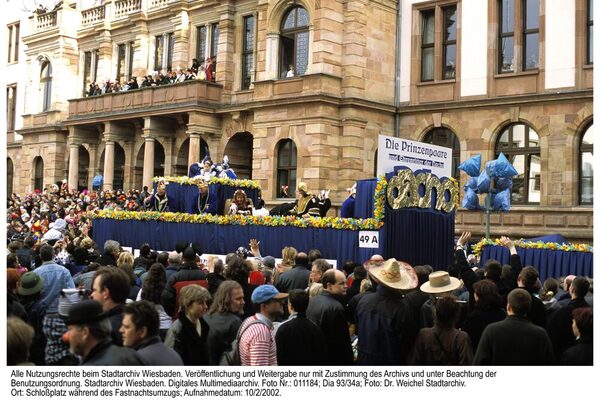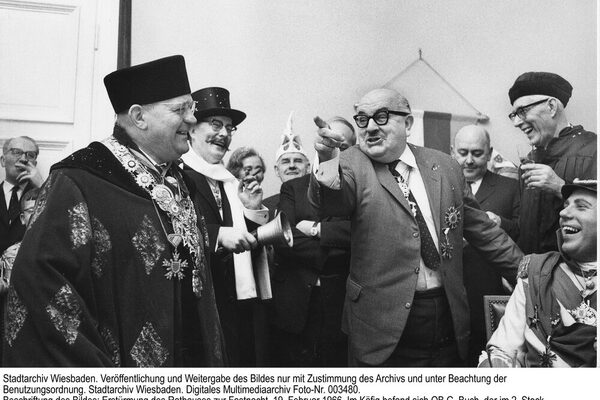Shrove Tuesday
Wiesbaden's carnival dates back to the Middle Ages and was celebrated in village communities, guilds or guilds. After the Reformation, the Protestant rulers tried to stop the festivities. In 1538, an edict banned carnival celebrations. In 1656, a decree prohibited "dancing at night, throwing around and all other lewd gestures and words". Bans on carnival are also known from the 18th century. It was only after the founding of the Duchy of Nassau in 1806 that carnival customs were tolerated, which were never completely abandoned despite all the bans and restrictions. From 1807, masked balls were held in the Badhaus Schützenhof and later in the Kurhaus.
Fastnacht flourished again in Wiesbaden, particularly in connection with the development of bourgeois club life in the 19th century. The year 1859 is considered the founding year of the organized Wiesbaden carnival. The first pure carnival societies were the "Allotria", "Fidelio" and the "Carneval Gesellschaft Liederkranz". On 22.11.1862, the "Künstler-Club" and the "Gesellige Verein" merged to form the "Sprudel" society, the oldest carnival society in Wiesbaden still in existence today. Its members included civil servants, artists, merchants and professors. The meetings were given local color through dialectal speeches, so-called carnival speeches, and the appearance of the "Virreche", a typical representative of the established bourgeoisie. From 1866, the "Sprudel" cooperated with the Männergesangverein von 1841 (MGV), with which it later merged. The Hotel Viktoria became the venue for meetings in 1874.
Over the course of the 19th century, the "Sprudel" developed into a carnival meeting place for the wealthy middle classes, while the "Narrhalla" had the task of "making the joys of carnival accessible to the less well-off". This also applied to the "Merwel", whose sessions were dominated by dialect presentations. Initially, no ladies were admitted to the large "foreign sessions". The active participants, the members of the clubs, the carnival speakers, the Elferrat and the session president were all male, a tradition that - at least as far as the composition of the session committees and the presidium are concerned - still has an impact today. The "Wiesbadener Brühbrunnen-, Kreppel-, Kaffeemiehl- und Brödcher-Zeitung" by writer and editor Johann Christian Glücklich first appeared in 1873 and only ceased publication in 1914. In the following years, it was impossible to imagine Wiesbaden's carnival without the Kreppel or carnival newspapers, which made fun of local events. The best known was Franz Bossong's Wäsch-Bitt. On its 25th anniversary in 1887, the "Sprudel" organized the first carnival parade through Wiesbaden with 55 parade numbers and 800 participants. This year saw the first appearance of the "Prinzengarde", Wiesbaden's first carnival guard, formed from the ranks of the fencing club. The Prinzengarde, which still exists today and was founded around 1900, was a creation of the Athletes' Club. In the same year, the first carnival "prince and princess" appeared, with the "princess" being played by a man, which remained the custom until the 1930s.
Until the First World War, the "Sprudel" maintained its position as Wiesbaden's most important carnival club with excellent connections to the leading social circles of the Wilhelmine era. Ferdinand Hey'l was president until 1890, followed by the entrepreneur Christian Kalkbrenner until 1910. In 1893, the club had 600 members. In 1895, the association celebrated its 3rd anniversary, i.e. its 33rd anniversary. That year, director Georg von Hülsen made the new large theater available for the big carnival festival with the express permission of Kaiser Wilhelm II. Popular, successful humorists of this time were Franz Bossong, who played the "Virreche" at the Sprudel sessions for a long time, and the civil servant Josef Biez (1871-1937), who performed at the large clubs "Sprudel", "Narrhalla" and "Merwel", but also on many popular stages outside Wiesbaden. The master locksmith Karl Leicher (1872-1949), a real "Wiesbaden boy" with a splendid tenor voice, also worked as a singing humorist in Düsseldorf and many other German cities. His domain was the "Merwel". Other cannons of performance were the comic playwright Curt Kraatz, Joseph Hupfeld, Wilhelm Jacoby from Mainz and Julius Rosenthal. The carnival speeches, the "Büttenreden", reflected the rise of Wiesbaden at the turn of the century and the resulting costs, the increased tax payments and the loss of the familiar cityscape. But supra-regional topics, events in the Reichstag, the Boer War and court affairs were also addressed. In 1908, the "Wiesbadener Karnevalsgesellschaft 1908" (Wiesbaden Carnival Society 1908) was founded, which played a major role in shrovetide events in Wiesbaden until 1958.
During the occupation after the First World War, the ban on gatherings issued by the French imposed restraint on carnival clubs; masked balls in particular were prohibited. The carnivalists were active in unsuspicious organizations such as the Turn- und Sportverein Wiesbaden, based in Hellmundstraße (today Eintrachthaus). The organizer was the "Verband mittelrheinischer Privat-, Unterhaltungs- und Mandolinengesellschaften e.V.". After the end of the French occupation and the handover of the town to the British at the end of 1925, carnival activities were revived. The spa administration organized a "Sprudelabend" in the Kurhaus, where "Prinz Karneval" was taken out of a large moth box. On 16.01.1926, the "Buchdrucker-Komitee" was founded in the Gewerkschaftshaus, from which the Gesangverein Gutenberg emerged in 1927 and the carnival club "Die Spinner", which still exists today, in 1930.
After 1933, foolish criticism was undesirable and the so-called freedom of the carnival was abolished. Carnival on the Rhine was under strict control. "Die Spinner", who were members of the trade union as book printers, were hit particularly hard. The association was dissolved in May 1933 and its inventory confiscated. The "Sprudel" as the more or less "official" embodiment of the Wiesbaden carnival was supported by personalities from the city and the party. Under President Jacoby, several very well-attended events were held in 1934. After the end of the war, the "Carneval Verein Bierstadt" and the "Kolping-Fastnacht" were the first to become active again in 1947. The "Spinner", the "Carnevalverein Schierstein" and the "Jocus Garde" from Kostheim as well as the "Große Wiesbadener Karneval Gesellschaft 08" followed. The prince and princess of the 1948/1949 campaign were Paul I, the then well-known theater actor Paul Breitkopf, and Anneliese I, Anneliese Niemann, a stewardess by profession. In 1949, around 200 children and young people responded to a call to take part in the parade and formed the "Wiesbadener Ratschengarde" the following year. The "Schockelgaul" built in those days still rides in the carnival procession today. On February 28, 1949, the first Rose Monday parade passed through the city in front of 250,000 spectators under the motto "It's a success - Wiesbaden is crazy". In 1950, the Dacho (Dachorganisation Wiesbadener Karneval 1950 e.V.) was founded in the Wartburg. In 1957, several clubs, the "Große Narrenzunft Wiesbadener Sprudel", the "Große Wiesbadener Carnevalgesellschaft 08", the "Wiesbadener Carneval Club" and the "Rheinische Eulenspiegel" merged under the traditional name "Sprudel". The "Sprudel" still exists today; among other things, it is known for its social sessions, which it holds in retirement homes and rehabilitation clinics. 100 years of organized carnival were celebrated in the 1958/59 campaign.
When the city council cut the Dacho's funding for the carnival parade in 1982, which was now held on Sundays so as not to compete with the Rose Monday parade in Mainz, and the Dacho canceled the parade without replacement in protest, a spontaneously founded "Emergency Committee of Wiesbaden Fools" was able to step in and offer the people of Wiesbaden the "greatest fun since the invention of Wiesbaden" under the acronym "LALÜ" (Locker, Alternativ, Lustvoll, Übermütig). On Shrove Tuesday 1982, several thousand alternative jesters marched through the city center from 1:18 pm from Elsässer Platz, attracting around 80,000 spectators. The motifs of the alternative carnival procession were mainly concerned with the political issues of the time: Runway West, the education crisis, nuclear power, etc. Wolfgang Herber, an honorary city councillor since 1997, took part as an alternative mayor and boasted about the successes of his austerity policy at the expense of the little man at the final rally on Schlossplatz. ZDF broadcast the Schlossplatz rally live. Every year, the children's parade takes place on Shrove Saturday and the big traditional parade on Shrove Sunday.
Literature
Forßbohm, Brigitte (ed.): Die Wäsch-Bitt von Franz Bossong. Hilarious and satirical stories from the old Wiesbaden 1897-1900, Wiesbaden 1998.
Fritsch, Franz: Laughing, alluring, cheerful Wiesbaden. A cheerful chronicle of the last 100 years of the spa town and its carnival, Wiesbaden 1959.

